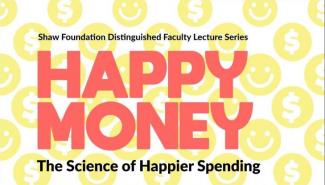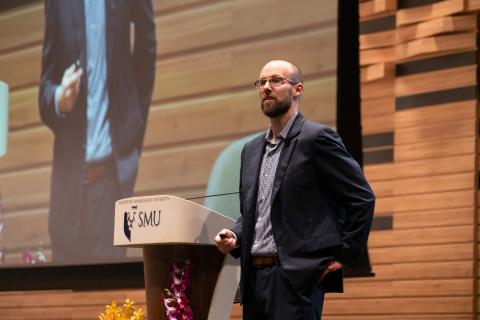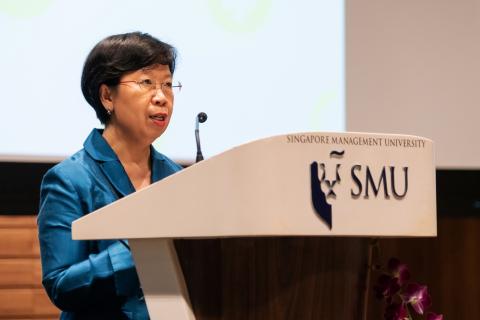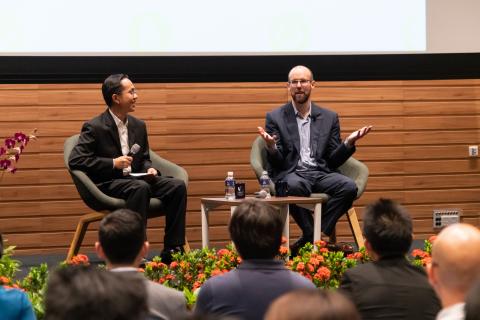
“How would you spend $20 to make yourself the happiest? Think of the last $20 that you spent – what did you spend it on? How many of you in the room have the same answer to both questions?” asked Michael Norton, Harold M. Brierley Professor of Business Administration at the Harvard Business School at the Shaw Foundation Distinguished Faculty Lecture Series, held at the Singapore Management University (SMU) on 25 October 2019.
The Lecture Series, which was established by the Shaw Foundation in 2001, aimed to make meaningful impact by stimulating ideas and interactive discourse on pertinent issues that affect the well-being of people, organisations and societies. Prof Norton addressed an audience that numbered over a thousand participants, comprising first-year undergraduates across SMU’s six Schools, as well as staff, faculty and members of the community.
During the evening lecture, Prof Norton, who co-authored the bestseller, “Happy Money: The Science of Happier Spending”, spoke on research-based principles designed to help people use their money in happier ways. He shared insights from the book, including recent research and examples that illustrate how individuals gain happiness by choosing "experiences over stuff" to how companies seek to create happier employees or “happier products” for their customers.

A noted authority in the field of psychology, Professor Norton has studied human behaviour in domains such as love and inequality, time and money, and happiness and grief. Of note, he was identified as one of the “50 People Who Will Change the World” by Wired Magazine. His TEDx talk, How to Buy Happiness, has been viewed more than 3 million times.
Witty and engaging, Prof Norton peppered his lecture with wry humour and relatable examples that illustrated his points. “Every self-help book usually has a chapter titled “why money can’t buy happiness”, likely chapter 7,” he mused, to laughter from the audience. “If you don’t remember anything else from this lecture, remember this: if you think money can’t buy happiness, you’re usually not spending it right.”
That said, Prof Norton cautioned his audience, saying, “Having more money would not make you happier. What would help is the decisions you make in life and the relationships you form. The percentage of your income you spend on stuff is not correlated to your happiness. The size of your apartment or car does not affect how happy you are. You still have the same spouse, the same job; and the apartment or car would not alter how happy you are in life.”
Commenting on the effects of buying experiences (instead of material goods), buying time and investing in others, and the levels of happiness experienced, Prof Norton said: “People who spend on other people, get happier. For people who bought stuff for themselves, they stayed the same. It feels like spending on yourself would be good, but it actually doesn’t do anything much.” This experiment, which he and his team first conducted in Canada, was later repeated in Uganda. The results were largely similar.
“You may think that spending on others may not be that great, but it turns out that giving, or gifting, can make you feel pretty good. It’s rooted in us to be happier when we give to others,” said Prof Norton.
Themed “Happy Money: The Science of Happier Spending”, the lecture was organised by SMU’s Office of Core Curriculum and the Wee Kim Wee Centre. The Core Curriculum is SMU’s distinctive take on what students should have foundationally in their education. At the undergraduate level, SMU’s Core Curriculum, undergirded by the three pillars of Capabilities, Communities, and Civilisations, will be the first step toward the transformative education that each SMU student will experience, and will contribute toward the fulfilment of SMU’s Graduate Learning Outcomes. As part of this Curriculum, all freshmen will take a module titled Big Questions, which addresses a major challenge that humanity faces, broadly defined as a thesis and its (seeming) antithesis.
With an annually rotated theme, Big Questions is designed to expand students’ horizons about some of the most fundamental questions and challenges of the collective human condition. In AY2019/20, the Big Questions theme is Happiness and Suffering, where students will examine multidisciplinary perspectives on the nature, significance, expression, causes and consequences of happiness and suffering.

SMU President Prof Lily Kong welcomed students and guests in an address. She said, “Over the past millenia, great thinkers from Socrates and Aristotle to Amartya Sen and Peter Singer have questioned in one way or another what it means to be happy. We strive and struggle for it. We are willing to fight for it. Today’s modern and developed societies, which are affluent and technologically connected, may have bred a perception that having money relates to success, and that success equates to happiness. This is one of the Big Questions of our time, and it is one of the questions that our new Core Curriculum was designed to help us to explore.
Big Questions, a compulsory course under SMU’s Core Curriculum, aims to help our undergraduates frame the case for universal human experiences such as Happiness and Suffering. It is SMU’s distinctive take on what we believe our students should have foundationally in their education, broadening their understanding of the world, integrating curriculum, co-curriculum and their actual lives. Through the common intellectual experience curated by the University’s Office of Core Curriculum, students have the opportunity to cultivate emotional and integrative intelligence and decision-making skills, preparing them to thrive in careers across industries and geographies.”

The lecture was also organised alongside the inaugural SMU Big Questions Conference, with the objective of deepening the sharing of research in the sphere of happiness and suffering. Held at SMU from 25 to 26 October 2019, the Conference convened more than a dozen local and overseas scholars, who formed multidisciplinary panels to tackle themes such as “interdependence dilemmas”, “religion and happiness” and “measuring the public policy on happiness”.
The evening concluded with a Question and Answer session moderated by William Tov, Associate Professor of Psychology and Lee Kong Chian Fellow, School of Social Science, SMU. The lively session included a discussion on the merits of anonymous giving and giving with acknowledgement received, the possible advantages of buying experiences that turned out to be negative, as well as the difference between the impact of giving away windfall (“free money”) and earned income on happiness levels.